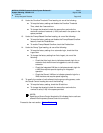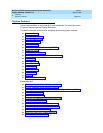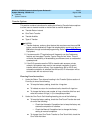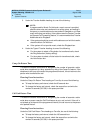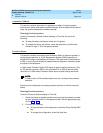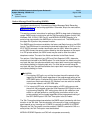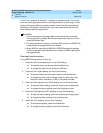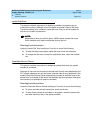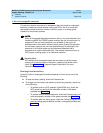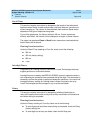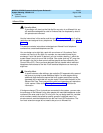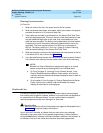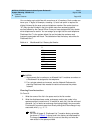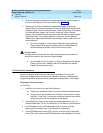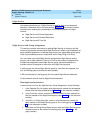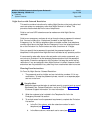
MERLIN LEGENDCommunications System Release 6.1
System Planning
555-661-112
Issue 1
August 1998
Features
Page 4-48System Features
4
Calls to Unassigned Extensions 4
This section contains instructions for designating that calls made to unassigned
extension numbers by remote access users or on DID or dial-in tie trunks are
redirected to another extension number, the QCC queue, or a calling group
instead of to the primary operator.
NOTE:NOTE:NOTE:
When an Automated Attendant transfers a call to a non-local extension, the
transferring MERLIN LEGEND system monitors the call to ensure that it is
answered. If the non-local extension is not available or the call is not
answered within the transfer redirect timeout period (fixed at 32 seconds),
the call stops ringing at the non-local destination and is redirected to the
extension on the same system as the Automated Attendant that is
programmed to receive redirected calls. This redirect extension can be a
QCC queue, a calling group, or an individual extension.
!
SecurityAlert:
DID numbers that correspond to pool dial-out codes (or facility access
codes) can be used to avoid toll restriction, leading to toll abuse and/or
fraud. (See Appendix A, “Customer Support Information” for more
information about security.)
Planning Form Instructions 4
Under the Calls to Unassigned Extensions heading on Form 8a, do
one
of the
following:
■ To keep the factory setting, check the Extension box.
■ To change from the factory-set redirect to the primary operator, check
one
of the following:
— To redirect calls to a QCC operator (Hybrid/PBX only), check the
QCC queue box and write the extension number in the space
provided (see Form 2a).
— To redirect calls to another telephone, check the Extension box and
write the extension number in the space provided (see Form 2a).
— To redirect calls to a calling group, check the Calling Group box and
write the calling group extension number in the space provided (see
Form 7d).



